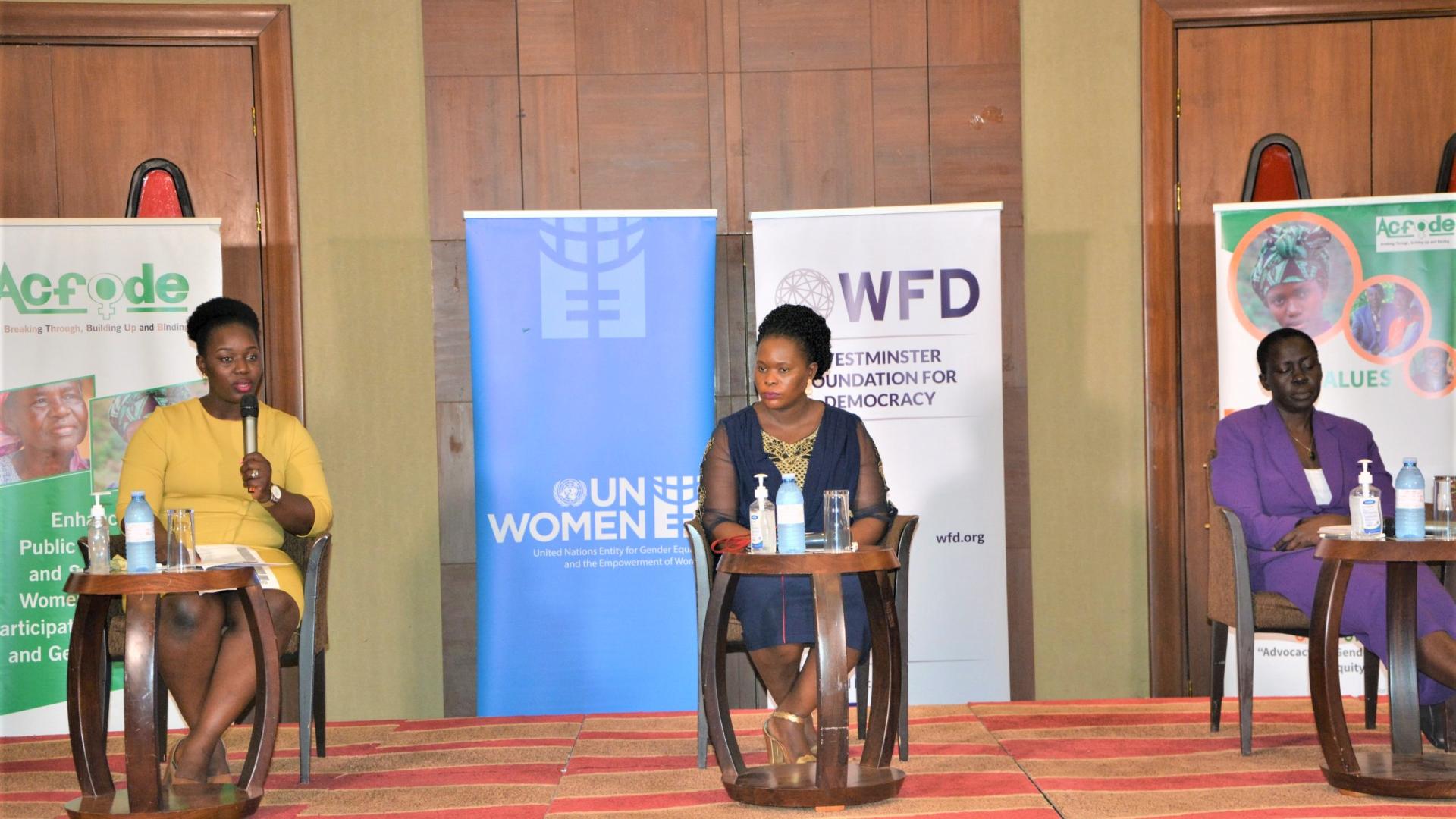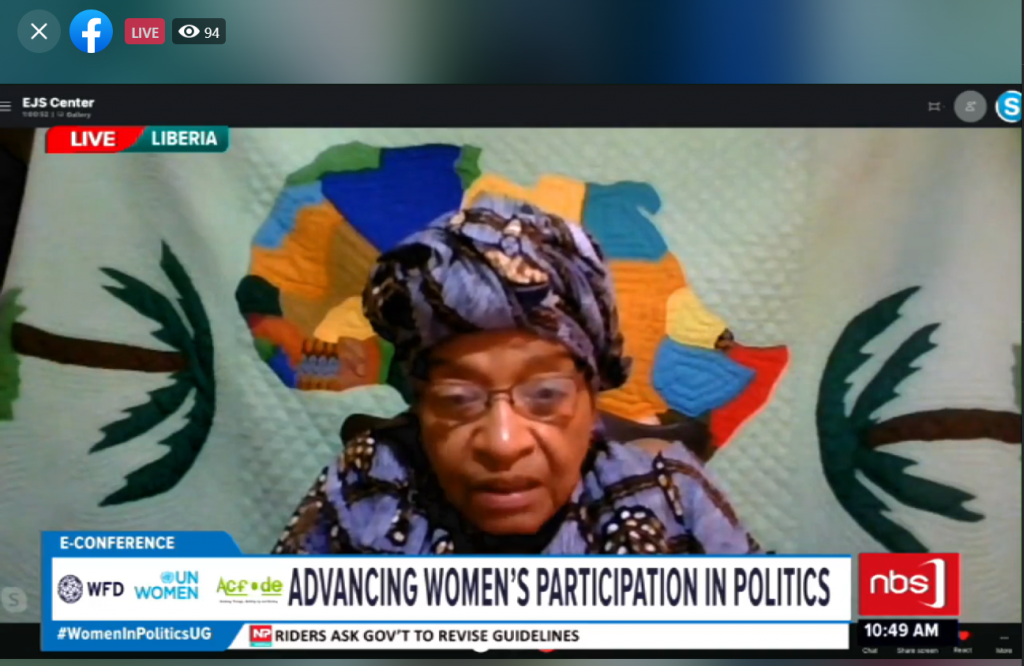Empowering women candidates to run successful campaigns ahead of the 2021 general elections in Uganda

The winds of change are blowing strongly. It is the winds that have brought consciousness about the long years of inequality and injustice. There is a resounding call for change and women and youth are at the forefront of these changes.
H.E. Ellen Johnson Sirleaf, former President of Liberia, speaking at the national e-conference for women political candidates in Uganda.
Promoting women’s political leadership and having women in positions of leadership results in better outcomes for women and girls and society. Including women ensures progress in policy areas vital for economic growth and development, such as health, education, and infrastructure. What is more, democracy in Uganda cannot be said to be living up to its promise if half of the population is not wholly engaged equally in decision-making.
Ahead of Uganda’s 2021 general elections, COVID-19 has presented additional challenges to aspiring women candidates’ effective participation especially after the Electoral Commission announced that campaigns will exclude public gatherings and only be conducted using traditional media, online platforms and other virtual campaigning methods.
These campaign methods are likely to disproportionately affect the participation of women candidates, many of whom lack access to traditional media and online platforms and cannot afford the cost of radio and TV airtime. If not mitigated, these challenges will discourage aspiring women candidates from running for office.
WFD, through its inclusive and accountable politics programme, is working towards greater access and inclusion of women and marginalized groups in formal and informal political participation.
WFD Uganda – in partnership with UN Women and Action for Development Uganda – organized a 2-day e-conference on 29 and 30 July 2020 to ensure women’s full political participation ahead of Uganda’s 2021 general elections.
The e-conference brought together over 150 women political candidates, female politicians, leaders from political parties, and representatives of the Electoral Commission (EC) and civil society, and reached over 800,000 people online and through NBS TV, where it was televised live. The online element was possible through our earlier capacity building efforts, teaching candidates how to use Zoom, equipping them to conduct virtual campaigns which will be the mode of operation in the coming elections.
The conference provided a platform to discuss the opportunities and challenges for women in politics, the best practices proven to win over voters and the tools to successfully conduct virtual political campaigns.
While giving her keynote address at the conference, H.E. Ellen Johnson Sirleaf, the former President of Liberia, highlighted that this is the time for women to take up leadership positions and challenge the current systems and structures.

She also emphasised that women must demonstrate a different leadership and show solidarity with each other, working together for the good of the community they seek to represent.
Echoing H.E. Sirleaf’s address, other guest speakers also emphasised that mindsets need to change because both men and women are equally entitled to participating in the development process of their countries. They also shared strategies on how women can win elective office like moving away from mobilization by focusing on organization and having a clear communications strategy.
Since campaigns will be conducted using traditional media, online platforms and other virtual campaigning methods, aspiring candidates need to be able to manage instances of cyberbullying and misinformation during online campaigns. At the conference, Seyi Akiwowo, the founder of Glitch, shared tips on how aspiring candidates can use social media safely.
Also present at the conference was WFD’s gender expert and Director of Programmes, Shannon O’Connell, who led a session on campaign fundraising in the context of virtual campaigns. During her presentation, Shannon broke down some myths on electoral fundraising and also emphasised the relevance of investing in oneself in order to demonstrate one’s worth as a woman candidate.
During the conference, former Ugandan Member of Parliament Hon. Alice Alaso shared her experience with electoral violence and how aspiring women candidates can manage this terrible threat.
Aspiring women candidates and participants pointed out that the platforms like the conference are a great opportunity for them to seek mentorship from current women leaders. They also appreciated the continuous support WFD and other organisations have given them especially through training and capacity building sessions and recognizing their effort as women in politics.
The ideas that are being shared in this conference are very practical and realistic. As an aspiring woman leader, I can easily relate to them to what I am currently experiencing.
Lawono Grace, participant attending the national e-conference for women political candidates.
Though Uganda’s legal framework on political competition does not discriminate against women and men during the elections, the social, economic and cultural construct of Uganda’s society inevitably creates impediments to women’s participation in politics particularly when it comes to elections.
With platforms like these, there is bound to be increased knowledge of strategies and mechanisms that can advance women’s participation in politics and national development.
As the general elections get closer, WFD Uganda will continuously engage aspiring women and youth leaders through trainings, mentorship sessions, capacity building sessions, among others. The 2021 general elections are an opportunity for women in Uganda to create the change the country needs to see in terms of representation in governance and policy spaces.